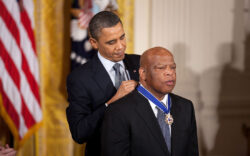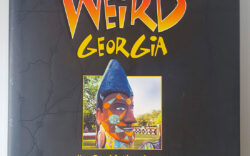When he died on Feb. 15 at the age of 74, political humorist P.J. O’Rourke was called “the last funny conservative” in a tribute written for The New York Times by Christopher Buckley, his fellow writer, a longtime friend and the son of conservative commentator William F. Buckley Jr. O’Rourke was a conservative with a mordant wit who skewered politicians on both sides of the aisle in his articles published in magazines ranging from National Lampoon to The Atlantic and in his books like Parliament of Whores and How the Hell Did This Happen: The Election of 2016.
During that election campaign, O’Rourke said that, in spite of his conservative credentials, he would vote for Democrat Hillary Clinton over Republican standard-bearer Donald Trump. “I just thought he was unstable,” said O’Rourke. “I still do.”
O’Rourke’s writings followed in the long tradition of political satire in America. Mark Twain blazed like a comet across the literary firmament more than a century ago. It was fitting that he was born during the appearance of Halley’s Comet in 1835, and he died when the comet came back into view in 1910. “We have the best government money can buy,” Twain once smirked. “The political and commercial morals of the United States are not merely food for laughter, they are an entire banquet.”
Eulogies for O’Rourke compared him to caustic columnist H.L. Mencken, and the comparison is apt. During his heyday in the 1920s, Mencken’s newspaper columns satirized U.S. politics but also warned readers that, “The men the American people admire the most extravagantly are the most daring liars: the men they detest most violently are those who try to tell them the truth.”
Like Mencken, Dorothy Parker was a witty observer of American culture and politics during the Roaring Twenties. “You can’t teach an old dogma new tricks,” she quipped.
Will Rogers combined homespun humor with sly political satire until his death in 1935. Rogers was proud of his cowboy skills and his Native American ancestry. “It’s easy being a humorist when you’ve got the whole government working for you,” he said. Rogers made millions laugh when he spoke his most famous aphorism: “I am not a member of any organized political party. I am a Democrat.”
After World War II, a new breed of political satirist was born in the smoky nightclubs of America. “Liberals feel unworthy of their possessions. Conservatives feel they deserve everything they have stolen,” Mort Sahl joked. Lenny Bruce said to his nightclub audiences, “Every day people are straying away from the church and going back to God.” African American comedian and activist Dick Gregory rose to prominence during the rise of the civil rights movement. In his nightclub act, television appearances and books like From the Back of The Bus, Gregory got laughs from interracial audiences with observations like, “I know the South very well. I spent 20 years there one night.”
Newspaper columnists Art Buchwald and Molly Ivins died within days of each other in 2007 after writing political humor and commentary for decades. “You can’t make up anything anymore,” said Buckwald. “The world itself is a satire.” Ivins warned her readers, “Many a time freedom has been rolled back, and always for the same sorry reason: fear.”
Comedian and social critic George Carlin died in 2008, but he left words of warning that are true today: “If you have selfish, ignorant citizens, you’re going to have selfish, ignorant leaders,” he said. “Never underestimate the power of stupid people in large groups.”
America needs its wry political observers, and O’Rourke earned his approbation as America’s last funny conservative. Today’s cultish conservative politicians like Marjorie Taylor Greene and Matt Gaetz are clownish, but they aren’t funny. When the current crop of right-wingers sneer that liberals lack a sense of humor, they conveniently forget the longtime liberal legacy of American political satirists like Mark Twain, who said, “The radical of one century is the conservative of the next. The radical invents the views, the conservative adopts them.”
Like what you just read? Support Flagpole by making a donation today. Every dollar you give helps fund our ongoing mission to provide Athens with quality, independent journalism.










